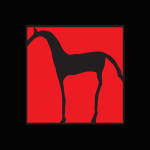Hark
Childhood and Early Reputation
Researchers are seeking more information about Hark’s life. By the 1850s, Hark was widely known as one of the best trainers in the horse racing business.
The Lecomte and Lexington Rivalry
In 1854, Lecomte and Lexington were among the most famous horses in America. Their competition in the that year’s Great Post Stakes in New Orleans, Louisiana became legendary. It fascinated both racing fans and casual observers nationwide. Hark’s involvement in their story preserved his own.
Hiring Hark
In the first race between the two horses, Lecomte suffered a defeat by four lengths. Lecomte’s owner, Thomas Jefferson Wells sought to avenge this loss. He consulted his friend, William J. Minor, who recommended Wells contact the Merritt family in Virginia. He hired Hark from them to consult on turning Lecomte into a winner.1 Like Charles Stewart, Hark was well-known as an expert trainer.2
Hark’s Impact
Hark assessed the loss and decided that a new jockey would make the difference for Lecomte. Hark turned to Abe Hawkin. Hawkins was an enslaved jockey with a reputation as a fierce and competitive winner.3 In the next heat, Hawkins rode Lecomte to a dramatic, record-breaking victory, that made both Hark and Hawkins famous.4
Legacy
Details of Hark’s career and the time and circumstances of his death remain unknown. Though researchers have learned only fragments of his life, Hark’s impact is still remembered.
Sources
Hotaling, Edward. The Great Black Jockeys: The Lives and Times of the Men Who Dominated America’s First National Sport. Rocklin, Calif.: Forum, 1999.
Mooney, Katherine. Race Horse Men: How Slavery and Freedom Were Made at the Racetrack. Cambridge, Massachusetts: Harvard University Press, 2014.
Citation
When citing this article as a source in Chicago Manual of Style use this format: Last name, first name of Author. Chronicle of African Americans in the Horse Industry. n.d. “Title of Profile or Story.” International Museum of the Horse. Accessed date. URL of page cited.



